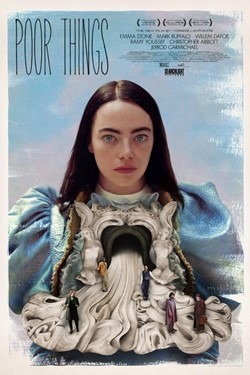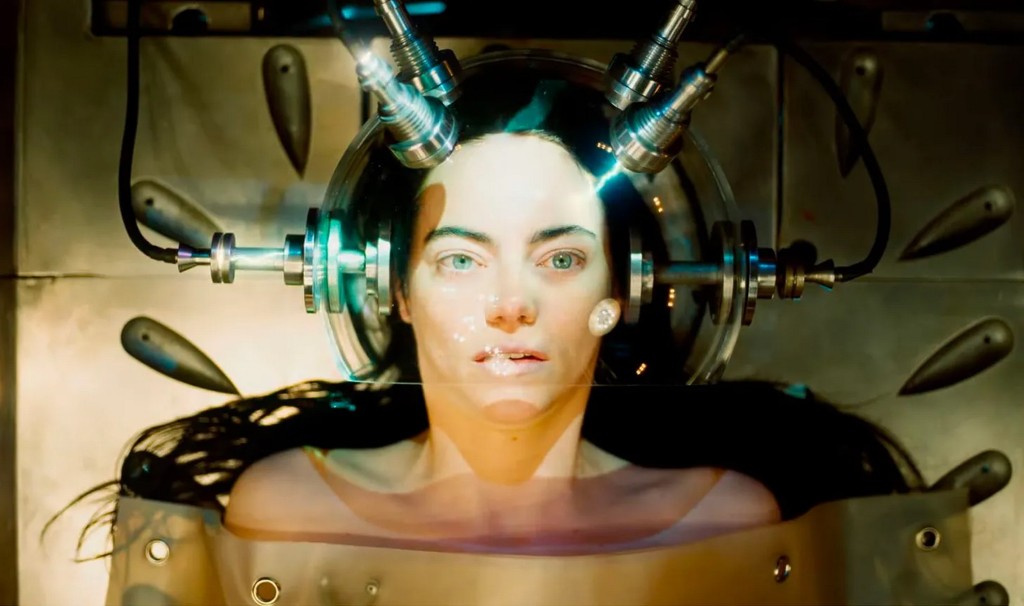Director: Yorgos Lanthimos
Cast: Emma Stone, Mark Ruffalo, Willem Dafoe, Ramy Youssef, Christopher Abbott, Kathryn Hunter, Jerrod Carmichael, Hanna Schygulla
Genre: Fantasy/Comedy
Run Time: 141 min
Opens: 20 January 2024 (Limited screenings only at The Projector)
Rating: R21

It’s awards season again, and director Yorgos Lanthimos of Killing of a Sacred Deer, The Lobster and The Favourite fame can always be counted on to make an awards contender movie that’s a bit of an odd duck. This might be his oddest duck yet – or a duck’s head sewn onto a dog’s body, if you will.
Bella Baxter (Emma Stone) is a woman who leapt off a bridge and was brought back to life by surgeon Godwin Baxter (Willem Dafoe). Godwin raises Bella as his ward. Bella has a child-like demeanour but learns and evolves quickly. Max McCandles (Ramy Youssef), whom Godwin takes on as his assistant, begins to fall for Bella. As Bella’s intelligence and curiousity develops, she yearns to experience the outside world. She runs away with the caddish lawyer Duncan Wedderburn (Mark Ruffalo), embarking on a journey of self-discovery and experiencing a sexual awakening. Bella’s journey takes her from London to Lisbon, then on a cruise to Alexandria, on to Marseilles and Paris. Bella begins to form her identity and learn more about the human condition, as her former life before she was found and resurrected by Godwin catches up with her.

Poor Things is adapted from the novel by Alasdair Gray. The surreal Victorian fantasy setting of Poor Things is immediately captivating. Production designers James Price and Shona Heath and costume designer Hannah Waddington contribute to an entirely fabricated reality. Inspired by the painted skies and miniature used to create the Himalayas in Powell and Pressburger’s Black Narcissus, and the soundstage-bound look of Francis Ford Coppola’s Bram Stoker’s Dracula, Poor Things is a carefully constructed bauble, a movie that lives in a snow globe. Director of Photography Robbie Ryan shoots the movie partially on Kodak’s 35mm Ektachrome colour reversal motion picture film stock, giving the movie a tactility despite its artificiality. The atmosphere of the movie is heightened, and Tony McNamara’s screenplay is often brazenly funny, but there is a subtlety beneath the surface and the movie’s mannered exterior belies its many complexities.

As can sometimes happen with movies like this, there is a barrier that can form between the movie and the audiences because Poor Things is so mannered and so deliberately constructed as to sometimes feel impenetrable. While we are drawn into Bella’s journey, the movie’s 142-minute-long runtime feels excessive, especially because the structure of the movie includes what can best be described as a surprise fourth act where one might think the movie would end. Poor Things is a very different movie from Barbie, but just like Barbie, Poor Things’ version of feminism will be subject to scrutiny, as it should be. Both movies are about women learning to exist in the outside world, and discovering their autonomy after an existence of being defined by others. Some have taken issue with how the movie presents exploitation as something that women should just accept and attempt to repurpose, and not everyone will agree with its depiction of bodily autonomy, given the spectrum on which opinions on that topic exist.

This is very much Emma Stone’s movie to carry, something she does with confidence and magnetism. Usually, if a performance is described as “fearless” or “brave”, it still denotes a certain degree of preciousness and connotes a blatant bid for awards. Stone’s turn as Bella is fearless and brave in a way befitting of a Lanthimos movie. Having worked with Lanthimos on The Favourite, Stone feels completely comfortable in a challenging role, unfazed by the sheer amount of nudity and fully embracing Bella’s evolution from blank slate to someone with an identity and agency. One of the most interesting aspects of the character is how she speaks: Bella starts off speaking in simplistic repeated phrases, but her vocabulary builds over time. During the middle stretch of the film, she speaks like she’s reading from a thesaurus, listing off synonyms, and we see how her increasingly complicated thought processes are reflected in her speech. This is a role that Stone commits fully too, but also one that she’s having a great deal of fun with.

Mark Ruffalo is hilarious as the lawyer who finds himself utterly obsessed with Bella, someone whom he initially thought he could take advantage of. Ruffalo’s delivery and comic timing, enhanced by a mid-Atlantic accent, are hilarious even when the character becomes increasingly unlikeable, and both Bella and the audience begin to chafe at him.

Willem Dafoe is perfectly cast as the Victor Frankenstein-esque Baxter Godwin. He is paternal towards Bella but is something of a mad scientist himself. The movie’s black comedy manifests itself in moments like when Baxter recounts experiments his own father did on him. Baxter is very much a sympathetic monster, one who is driven to create other sympathetic monsters. His work, including chimerical animals like the aforementioned duck-dog hybrid, is ethically dubious, but it’s easy to feel affectionate towards him.

Ramy Youssef’s Max McCandles is the most decent person in the story, someone whose affection towards Bella keeps getting shunted aside as she goes on her adventures. Of all the men in the story, Max is arguably the one who views Bella the least as an object, but he still sees her as fulfilling a societal role.

The rest of the supporting cast is wonderful, including Kathryn Hunter as a wily madame and Christopher Abbott showing up late in the movie as a cruel and self-absorbed aristocratic general.

Summary: Poor Things is a deliberately weird, sometimes-unsettling and alienating but often funny movie about self-discovery. Director Yorgos Lanthimos embraces the movie’s surrealistic setting and its deliberately artificial design elements are captivating. Emma Stone’s performance as a Frankenstein’s Monster-like character experiencing a sexual awakening and gradually gaining agency and forming her identity is one that’s irresistible and richly layered. Mark Ruffalo is hilarious as an untrustworthy cad, while Willem Dafoe is perfectly cast as the Victor Frankenstein-like father figure. Every awards season has the oddball kid, and Poor Things has firmly established itself as that this year.
RATING: 4 out of 5 Stars
Jedd Jong


























































